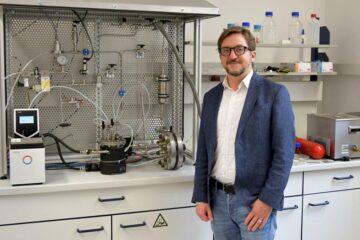Thermomorphic Enzyme Recycling – One-phase process engineering and two-phase separation by temperature control

Biocatalysts are playing an ever increasing role in economical and sustainable processes. A well-known example is the production of acrylamide by Mitsubishi Rayon which illustrates the advantages over the traditional chemical routes. However, only a few processes are known, in which the biocatalyst can be economically separated and re-used without loss of activity until now.
Well-established methods to obtain biocatalysts for re-use are e.g. the immobilization via adsorption onto suitable support materials, encapsulation in aqueous gels or cross-linked enzyme aggregates. All these recycling methods suffer from leaching of the enzyme and often from a substantial loss in activity. Laborious modifications of the enzyme are partly essential or highly-priced apparatus for efficient separation needs to be implemented. Another method is the usage of a liquid-liquid two-phase system, consisting of an aqueous medium and a water-immiscible organic solvent. But mass transfer limitations between the two immiscible phases are hardly narrowing the economically possible field of applications. In the present invention, mass transfer limitations even with very non-polar compounds do not occur because a temperature-dependent miscibility gap of the selected solvent compounds is used. The reaction is carried out under monophasic conditions and cooling down leads to a biphasic system in which the catalyst phase can be simply separated from the product phase and used again. Thermomorphic Enzyme Recycling is an absolutely easy controllable process over a wide range of temperatures, solvent mixtures and operating conditions.
Weitere Informationen: PDF
PROvendis GmbH
Tel.: +49 (0)208/94105 10
Ansprechpartner
Dipl.-Ing. Alfred Schillert
Media Contact
Alle Nachrichten aus der Kategorie: Technologieangebote
Neueste Beiträge

Ideen für die Zukunft
TU Berlin präsentiert sich vom 22. bis 26. April 2024 mit neun Projekten auf der Hannover Messe 2024. Die HANNOVER MESSE gilt als die Weltleitmesse der Industrie. Ihr diesjähriger Schwerpunkt…

Peptide auf interstellarem Eis
Dass einfache Peptide auf kosmischen Staubkörnern entstehen können, wurde vom Forschungsteam um Dr. Serge Krasnokutski vom Astrophysikalischen Labor des Max-Planck-Instituts für Astronomie an der Universität Jena bereits gezeigt. Bisher ging…

Wasserstoff-Produktion in der heimischen Garage
Forschungsteam der Frankfurt UAS entwickelt Prototyp für Privathaushalte: Förderzusage vom Land Hessen für 2. Projektphase. Wasserstoff als Energieträger der Zukunft ist nicht frei verfügbar, sondern muss aufwendig hergestellt werden. Das…

















